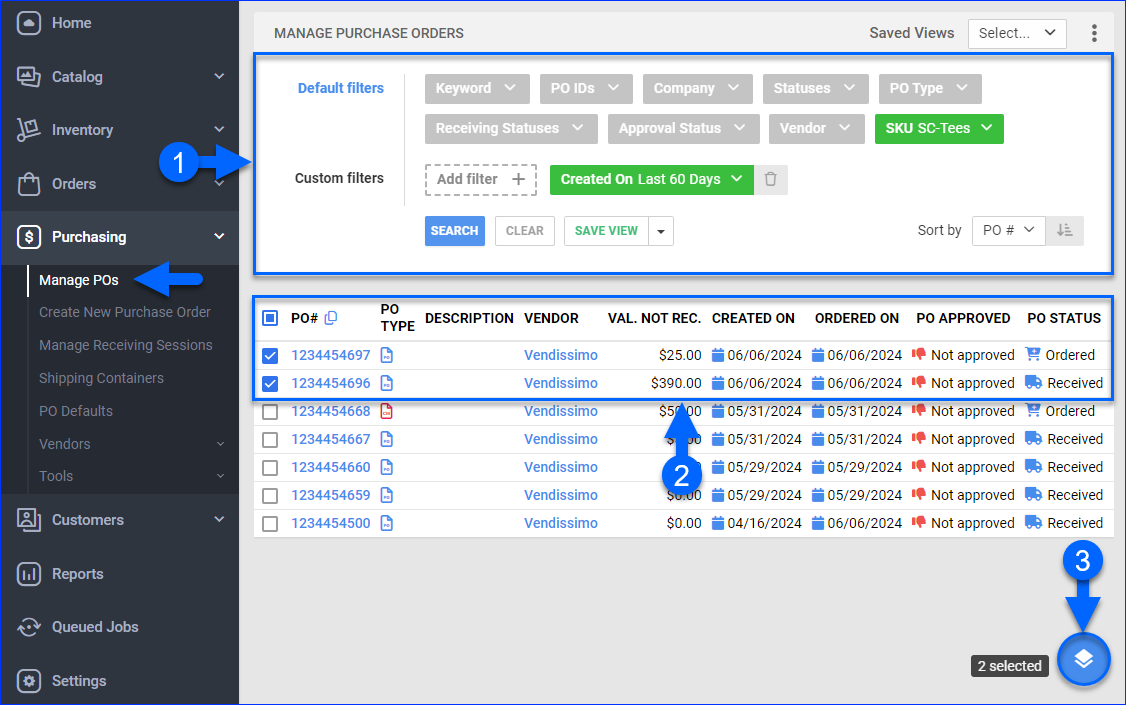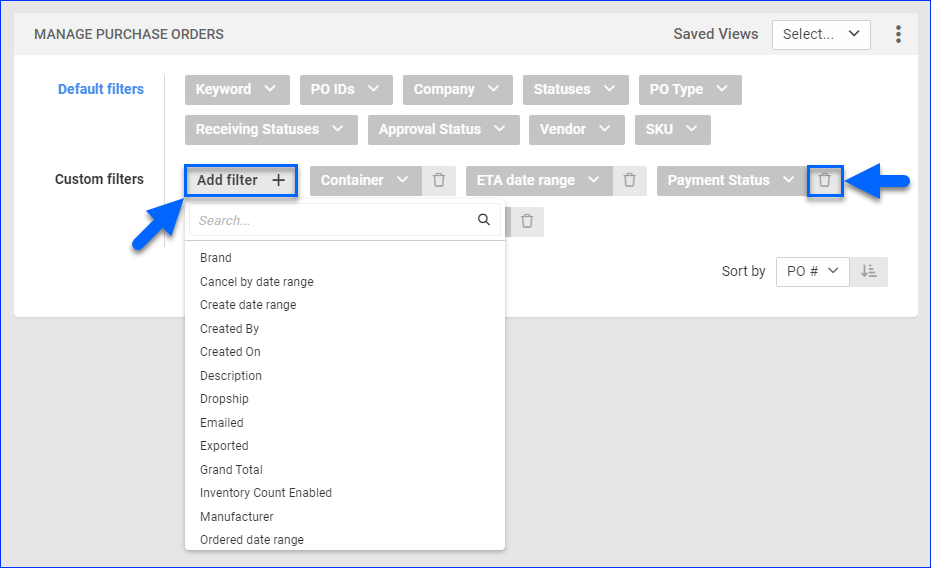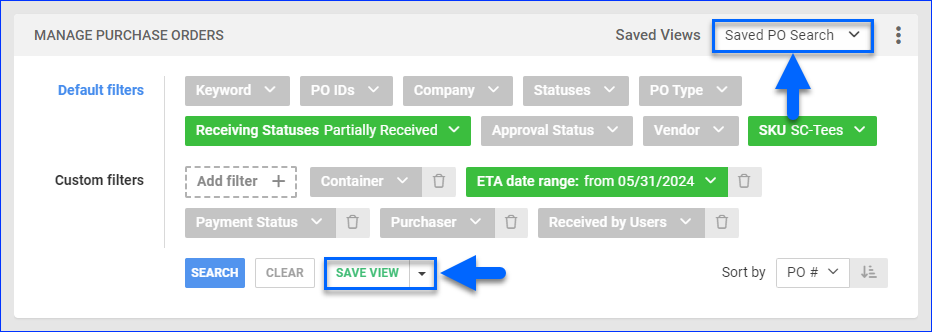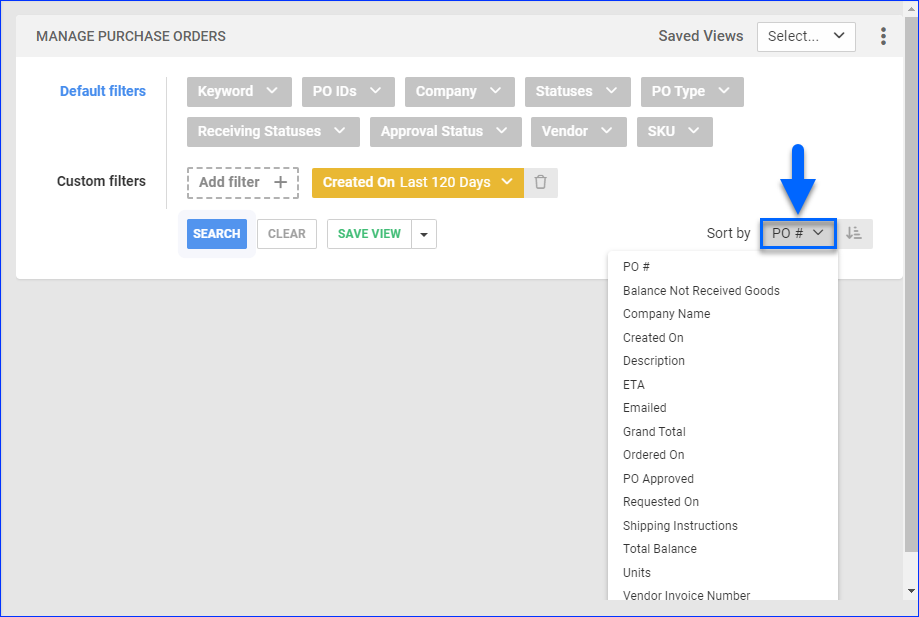Overview
Sellercloud’s Manage Purchase Orders (POs) page gives you quick and easy access to all your Purchase Orders. On this page, you can:
- View all POs in your Sellercloud account
- Use search filters to show only specific POs
- Save your filters to effortlessly repeat searches
- Sort the list of POs based on different columns
- Show or hide data columns from the list
- Perform individual and bulk actions related to POs, such as changing statuses, exporting details, unreceiving, and more.
Page Overview
To access your POs, go to Purchasing > Manage POs.
The Manage POs page consists of:
- Search Filters – Use to get specific results. You can save searches for repeat use.
- Search Results – A list of POs matching your search filters. You can sort it differently and show or hide data columns.
- Actions – Actions related to POs.
Search Filters
Filters offer multiple-choice selection lists or allow you to enter specific values. Your choices build on each other. Each subsequent choice narrows the scope of your search results further and affects what the page displays. You can add as many filters as you like or none at all.
There are Default filters that are always displayed and Custom filters that you can display manually by clicking the Add filter button and selecting a filter from the list. To remove a custom filter from the page, click the Trash icon next to it.
After you click Search, each filter you apply gets highlighted in orange or green. If a filter is gray or not displayed at all, it’s not active. You can add or remove filters and search again at any time.
Once you have set up your filters, you can click Save View to save the search. Then, you can repeat the same search by selecting it from the Saved Views menu on the top right.
Search Results
The search results display a list of POs matching your search criteria, with data columns showing various PO details.
You can add, remove, and even reorder data columns. To do so, click the three dots icon at the top right and select Customize Columns. Some of the available optional columns are PO Type, Created By, Receiving Warehouse, Most Expensive SKU, and Grand Total.
In the pop-up modal, you can :
- Reorder columns by dragging them vertically in the list
- Hide columns by clicking the Trash icons
- Add columns by clicking Add column
You can also sort the POs list in a different order based on a specific column using the Sort by drop-down menu.
Actions
The Manage POs page also has actions for PO management.
The Actions icon is located on the bottom right of the page. By default, it is a green plus icon that allows you to create a new PO. When you select POs from the search results by checking the boxes to their left, the icon turns blue. Once it’s blue, you can click it to manage all selected POs.
You can use the search to find a specific action quickly. Click the Star icon next to any frequently used action to pin it to the top of the actions list for quick access.
Most of these actions will display a notification at the bottom of the screen when used, telling you that a Queued Job has been created. You can click the link to the queued job to view it. Make sure to refresh the page to update the job’s Status.
Descriptions
This section lists and defines all available elements on the Manage POs page. This includes the search filters, the columns that display PO data and sort results, and the actions you can perform on selected POs. This article lists the elements by category for your convenience.
Filter Descriptions
See the following tables for all Default/Custom filters and their descriptions.
Default Filters
| Filter | Description |
| Keyword | Search by alphanumeric text in various fields throughout the PO, such as in the PO #, description, vendor, products, and more. |
| PO IDs | Search by the unique identification number assigned to each PO. The filter accepts multiple PO IDs. |
| Company | Show POs by Company. |
| Statuses | Show POs by their general Purchase status. |
| PO Type | Show only POs of these types: Credit Memo, PO, or Vendor Offer. |
| Receiving Statuses | Show POs by their Receiving status: None or Partially Received, Fully Received, Not Received, or Partially Received. |
| Approval Status | Show POs based on their Approval status. |
| Vendor | Show only POs with items purchased from specific Vendors. |
| SKU | Show only POs with specific SKUs. |
Custom Filters
| Filter | Description |
| Brand | Show only POs with items from specific Product Brands. |
| Cancel By Date Range | Show only POs whose deadline for cancellation is within a specific date range. |
| Container | Show only POs being delivered in Shipping Containers. |
| Create Date Range | Show only POs initially generated or created within a specific date range. |
| Created By | Show only POs created by specific Employees. |
| Created On | Show only POs initially created or generated within a specific date range. |
| Description | Shows POs based on their description. |
| Dropship | Show POs based on whether they have been automatically linked to a Dropship order or not. |
| ETA Date Range | Show only POs whose anticipated delivery date is within a specific date range. |
| Emailed | Show only POs where an email has been sent to the vendor. |
| Exported | Show only POs marked as Exported. |
| Grand Total | Show only POs by the total amount owed to the vendor. |
| Inventory Count Enabled | Show only POs based on whether they count toward your inventory. |
| Manufacturer | Show only POs with items from specific Manufacturers. |
| Ordered Date Range | Shows only POs placed within a specific date range. |
| PO/Order Relationship | Show POs based on whether they have been manually linked to a Dropship order or not. |
| Paid Date Range | Show POs by payment received within a specific date range. |
| Payment Status | Show POs by Payment Status. |
| Payment Terms | Show POs by Payment Terms. |
| Priority | Show POs by priority: High, Normal, or Low. |
| Product Group | Show POs with items from specific Product Groups. |
| Purchaser | Show POs by purchaser. |
| QB Exported | Shows POs based on whether they have been exported to QuickBooks or not. |
| Receive Date | Show POs that have been received within a custom date range. |
| Receive Date Range | Show POs that have been received within a predefined date range. |
| Received by Users | Show only POs received by specific Employees. |
| Receiving Warehouse | Show POs by their receiving Warehouse. |
| Requested On Date | Show only POs requested within a custom date range. |
| Requested On Date Range | Show only POs requested within a predefined date range. |
| Serial # | Show POs by items with specific Serial Numbers. |
| Shipping Statuses | Show POs by their Shipping status. |
| Tracking Number | Show POs with specific tracking numbers. |
| Units | Show only POs with item units within a specific range. |
| Updated On Date Range | Show POs updated within a custom date range. |
| Vendor IDs | Show POs with items from specific vendors, searching by the vendor’s unique identification number from the Purchasing > Vendors > Manage Vendors page. |
| Vendor Invoice No | Show POs by specific vendor invoice numbers. |
| Vendor Invoiced | Show POs based on whether the vendor has been invoiced or not. |
Column Descriptions
See the following table for all data columns and their descriptions.
| Column | Description |
| PO # | Clicking the PO # takes you to the PO Details Page. |
| PO Type | The type of PO: Credit Memo, PO, or Vendor Offer. |
| Description | The PO’s description. |
| Vendor | The Vendor selling the ordered items. |
| Value Not Received | The combined value of all items that have not yet been received. |
| Created On | The PO’s creation date. |
| Ordered On | The date when the PO was placed. |
| PO Approved | Indicates if the PO has been Approved. |
| PO Status | The PO’s general Purchase Status. |
| Receiving Status | The PO’s Receiving Status. |
| Received Date | The date when the PO items were received. |
| Payment Status | The PO’s Payment Status. |
| Requested On | The date when the PO was requested. |
| Balance | The total open balance of pending payments or overpayments. |
| Units | The total amount of product units in the PO. |
| Grand Total | The grand total amount paid for the PO. |
| Company name | The name of the Company associated with the PO. |
| Credit Memo | Indicates if there is a Credit Memo linked to the PO. |
| Emailed | Indicates if the PO has been emailed to the vendor. |
| ETA | The Expected Delivery date of the PO. |
| Inventory Disabled | Indicates if the PO has been disabled from counting toward your inventory. |
| Most Expensive SKU | Shows the most expensive SKU in the PO. If there are multiple SKUs, you will see the most expensive one and a count of the additional SKUs. |
| Priority | The Priority assigned to the PO. |
| Receiving Warehouse | The receiving warehouse of the items in the PO. |
| Shipped On | The PO’s shipping date. |
| Shipping Instructions | Special instructions for the PO. |
| Shipping Status | The PO’s Shipping status. |
| Vendor Invoice Number | The numbers of any associated Vendor Invoices. |
| Notes | Click on the Notes icon to view existing PO Notes and create new ones. |
You can show or hide these columns by clicking the three dots in the top right and selecting Customize Columns. To sort results based on these columns, use the Sort by menu.
Action Descriptions
See the following list for all actions and their descriptions.
| Action | Description |
| Unreceive Selected | Clear the received quantities of all receiving sessions from the selected POs. This is the reverse of the Receive Whole PO action. See Unreceive POs for more information. |
| Mark PO as Shipped | Manually change the Shipping status of the selected POs to Shipped. |
| Enable Inventory Count | Start counting the selected previously disabled POs toward the inventory once again. |
| Disable Inventory Count | Disable the selected POs from counting toward your inventory. Enable the Client Setting Allow To Ignore Inventory In Purchase Order for these actions to be available. |
| Add New Purchase Order | Create a new PO. |
| Delete | Delete the selected POs. You can’t undo this action. If a PO is linked to a sales order as part of the Dropship workflow, you will be prompted to confirm if you want to break that link. If you do so, the order’s Dropship Status will automatically change to None. |
| Export | Select from these options:
|
| Change Status | Change the selected POs’ general Purchase Status. |
| PO Approval | Approve or undo the approval of the selected POs. |
| Exported Status | Update the selected POs’ Exported status. |
| Exported To QuickBooks Status | Update the selected POs’ Exported to QuickBooks status. |





